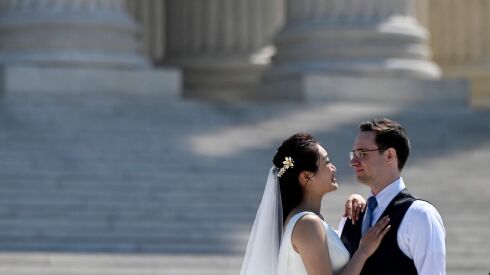The first thing you see when you approach the Kalapriya Center for Indian Performing Arts are maps.
The maps adorn the exterior and interior of the building. Each features the same outline of South Asia, splashed with primary colors, but telling a different story. One focuses on historical language families, another traces how people have migrated over time.
Mridu Sekhar, who runs the center in Chicago’s South Loop neighborhood, loves to reference these maps. She said they show the multidimensional nature of her history; how her personhood goes much deeper than being an Indian and a Hindu.
“I think the diversity of India is its strength,” Sekhar said. “And if you look at the people in that genetic pool, they’re all over the world, doing all kinds of things.”
But Sekhar, who grew up in India, worries the country is moving away from celebrating its diversity. At issue is the potential re-election of Prime Minister Narendra Modi.
Sekhar and some members of the Indian diaspora think Modi’s style of governance promotes Hindu nationalism. They’re concerned Modi is instituting policies that harm religious minorities in the country – a concern that’s impacting their faith.
“We’re very proud of the heritage we have. We are open to all ethnicities.” Sekhar said. “So, are we Hindu by, if you want to say birth? Yes. Do we respect all religions? Yes.”
India is a religiously diverse country including Muslims, Christians, Sikhs and Hindus. Hindus are by far the largest group, representing about 80% of the population, while only 14% of Indians are Muslim, according to Pew Research Center.
Hindu nationalist thought – the idea that India should enact policies prioritizing its majority-Hindu population – has grown in popularity in India over the past decade, overlapping with Modi’s time in office.
According to the international non-governmental organization Human Rights Watch, India has seen a rise in attacks against minority faith groups. Muslims have suffered from a range of vitrolic action, from hate speech to lynchings.
Modi’s critics accuse him of codifying Hindu nationalism. For example, this year Modi announced India is implementing a controversial 2019 law that fast tracks citizenship for non-Muslim immigrants from neighboring countries. According to the U.S. Commission on International Religious Freedom, Modi’s government, the Bharatiya Janata Party, originally delayed implementing the law after its announcement triggered large protests and violence.
Still, University of Chicago postdoctoral teaching fellow Andrew Kunze said there are several reasons why Modi is popular among some in the Hindu-Indian diaspora in the U.S.
India has risen through the global economic ranks under Modi’s tenure, becoming the fifth largest economy in the world. Like many Indians who immigrate to the U.S., he is from Gujarat. Modi also speaks about Hinduism as a centralized identity at a time when immigrants may be feeling isolated because they’ve gone from a majority to a minority faith by changing locations.
“Immigrants from many different sending states around the world become more religious upon immigrating to the U.S. And that is because among many other factors that religion, religious institutions, temples, churches, mosques, create a new sense of community that’s often lost by leaving whatever home country,” said Kunze, who studies contemporary Hinduism and Hindu nationalism.
The varying opinions on Modi leave some Hindus in Chicago – like Aastha Nirmal – uncertain of how to feel.
Nirmal’s name is synonymous with the Hindu Students’ Organization at Loyola University in Chicago. The sophomore runs the group’s philanthropy arm. She said she was atheist longer than she was Hindu, but came to embrace the faith she grew up with in recent years after a powerful experience with art.
Nirmal said her religion informs her approach to all aspects of life, including politics. Her family is tapped into the election, typing away their thoughts with each other in WhatsApp chats.
She declined to share who she supports in India’s current election, but she said Modi is popular for good reasons.
“I think my family is very back and forth about him. India has climbed up the economic power during his leadership,” Nirmal said. “There has been many great things that have happened. ”
He also opened the Samruddhi Mahamarg, one of India’s longest greenfield road projects that connects the country’s two major cities: Mumbai and Nagpur.
But Nirmal understands why his name is connected to Hindutva, or Hindu nationalism.
“There’ve been many horrible things,” Nirmal said. “I’ve seen firsthand how horribly the Hindu community treats the Muslim community. It’s bad.”
In January, for example, Modi opened a controversial Hindu temple in Ayodhya on the site of the former historic mosque Babri Masjid. Hindus consider the site to be the birthplace of Lord Rama, one of the most widely worshiped gods in the religion. The 16th century mosque was destroyed during deadly religious riots in 1992. It’s disputed which religious group has a rightful claim to the land.
Indians heading to the polls are weighing these considerations and others as they cast ballots in the world’s largest democratic process. Spanning 44 days over the course of seven phases, India’s election is gargantuan.
Polls in India close June 1, and the results will be announced June 4. Modi is strongly favored to win a third term – and Hindus in Chicago will be watching.
Adora Namigadde is a metro reporter and hosts the morning episodes of The Rundown podcast. You can follow her at @adorakn.




